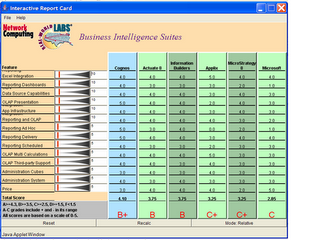A generic strategy for most companies attempting to increase market share would be to innovate with leading edge services or products and jump ahead of the competition. Not Google.
With Google Spreadsheets, they replicate an existing product that has been around for years, Excel, and shune the fact that it was created by the world's largest software maker, Microsoft.
You may say Google has too much time and money on their hands and their programmers are bored with building Internet search. But this could be one small strategic step with a leading edge vision.
One: I like this move because you shoot Microsoft in their sweet spot, Office products. Yes others have tried, but Google is on the software as a service (
SaaS) model and they have a massively well-known brand backing them.
Two: They are now going after market share other than the cool search/consumer industry.
Now, here's where we get to BI.
Combine Google's SaaS model with it's recent partnerships with BI vendors, which is their public attempt to reach the corporate market (and they will). Together, and given time, you get what SalesForce.com, NetSuite, and ADP have done successfully in their industries for years but now in the BI space.
BI via software as a service.Easy to use, Internet-based, BI paid by the month. No more unused licenses sitting on shelves. Increase or decrease users - only paying for what you need. You'd want configurable transformations and easy report building techniques.
Now before you
discount the SaaS model or raise the privacy of information issues, consider this. Of all the companies that could leap frog the competition with leading edge innovation and technology, Google is a sure bet.
And it could be BI's time to take the next visionary leap.



